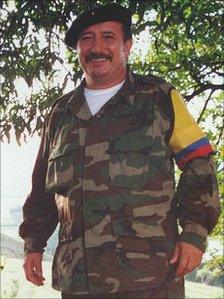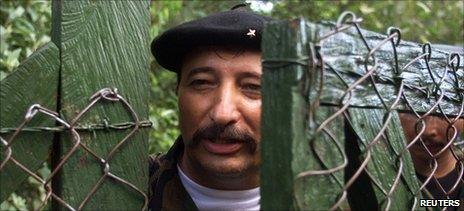My meeting with Mono Jojoy
- Published

Mono Jojoy was adored by Farc fighters, more than any other leader
Jorge Briceno, better known by his alias "Mono Jojoy" was revered in the ranks of the Revolutionary Armed Forces of Colombia (Farc).
He was the Farc's most feared general and head of the guerrillas' most powerful fighting division, the Eastern Bloc. With his death the rebels' dreams of marching on Bogota from his stronghold in the eastern province of Meta also died.
I met the Farc field marshal in 2000, when peace talks were under way in the safe haven of El Caguan, a 42,000-sq-km (16,200-sq-mile) zone delivered by then-president Andres Pastrana to the guerrillas to entice them to the negotiating table.
Like a medieval warlord, Mono Jojoy was holding court in a jungle clearing, surrounded by close commanders and his principally female bodyguard.
He believed that the female warriors were more trustworthy and more prepared to die for the revolutionary struggle.
Boisterous character
While the Farc negotiators were talking peace, Mono Jojoy was preparing for war.
Fearing that Colombia would become a narco-state and that the Farc would take power, President Bill Clinton had just enacted Plan Colombia and the first delivery of what to date has been more than $7bn (£4.4bn) of aid, mainly military.
"We have no quarrel with the American people," Mono Jojoy told me. "Our fight is with the Colombian oligarchy."
When I asked him if the Farc would respond to the US getting involved in the Colombian civilian conflict, he simply burst out laughing, clapped me on the back and asked if I wanted him to declare war on the US so I got a good story.
It was this boisterous sense of humour and a military cunning that won him adoration in Farc ranks. The rebels respect Alfonso Cano, the movement's ideologue and now the Farc chief, but they wanted to be led into battle by Mono Jojoy.
Lorena, 25, was a rebel who spent six years in the Farc, two of them alongside Mono Jojoy, before surrendering to the army in 2007 in Meta when she ran out of ammunition during a battle.
"He was the one we were prepared to die for," she said, nostalgic for her days of combat along the Farc leader, and now struggling to come to terms with the mundane life of a civilian in Bogota.

Mono Jojoy had taunted the army, claiming he was 'invincible'
Aged 57 at his death, Mono Jojoy once told journalists that he never thought he would live beyond 42, when he had a close brush with death. "Every day since has been a bonus," he said.
The government and the army had a very different opinion of who they saw as their nemesis. With the death of Mono Jojoy, President Juan Manuel Santos said that "the symbol of terror in Colombia has fallen".
Myth of invincibility
The death of their foremost military commander is a huge blow to the morale of the Farc.
He had taunted the army task force hunting him for more than eight years, his myth of invincibility intact despite the rebels suffering a series of defeats and being pushed into their mountain and jungle strongholds by the US-backed military.
There is no other commander in the Farc, not even Cano, who commanded the same loyalty throughout the movement as Mono Jojoy.
The once-mighty Eastern Bloc, Mono Jojoy's division of rebels, once 7,000-strong, is but a shadow of its former self. Now, without his leadership, it will skulk yet deeper into the jungles of south-eastern Colombia.
Since 2002 the Farc have been gradually losing ground, numbers, power and income. But they always held the hope that with leaders like Mono Jojoy, the tide would again turn in their favour.
There is no-one they have that can replace him. Now, maybe they might decide that peace is really an option.
- Published23 September 2010
- Published23 September 2010
- Published29 August 2013